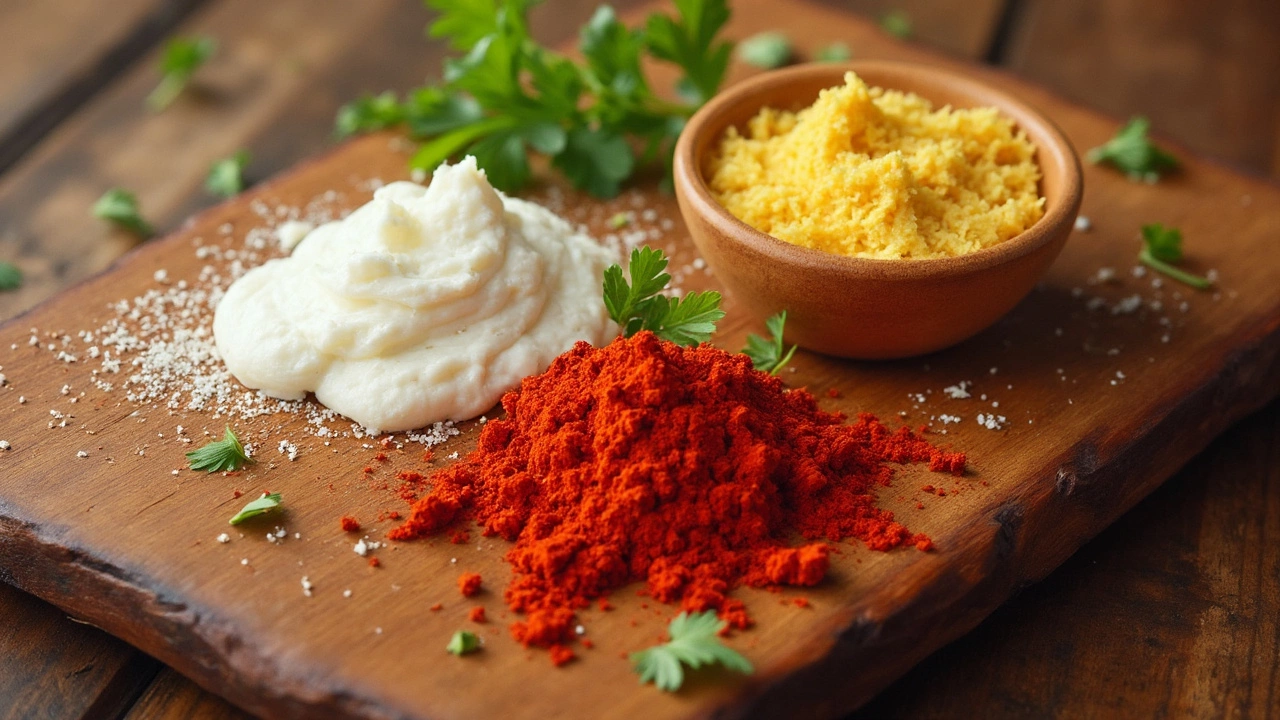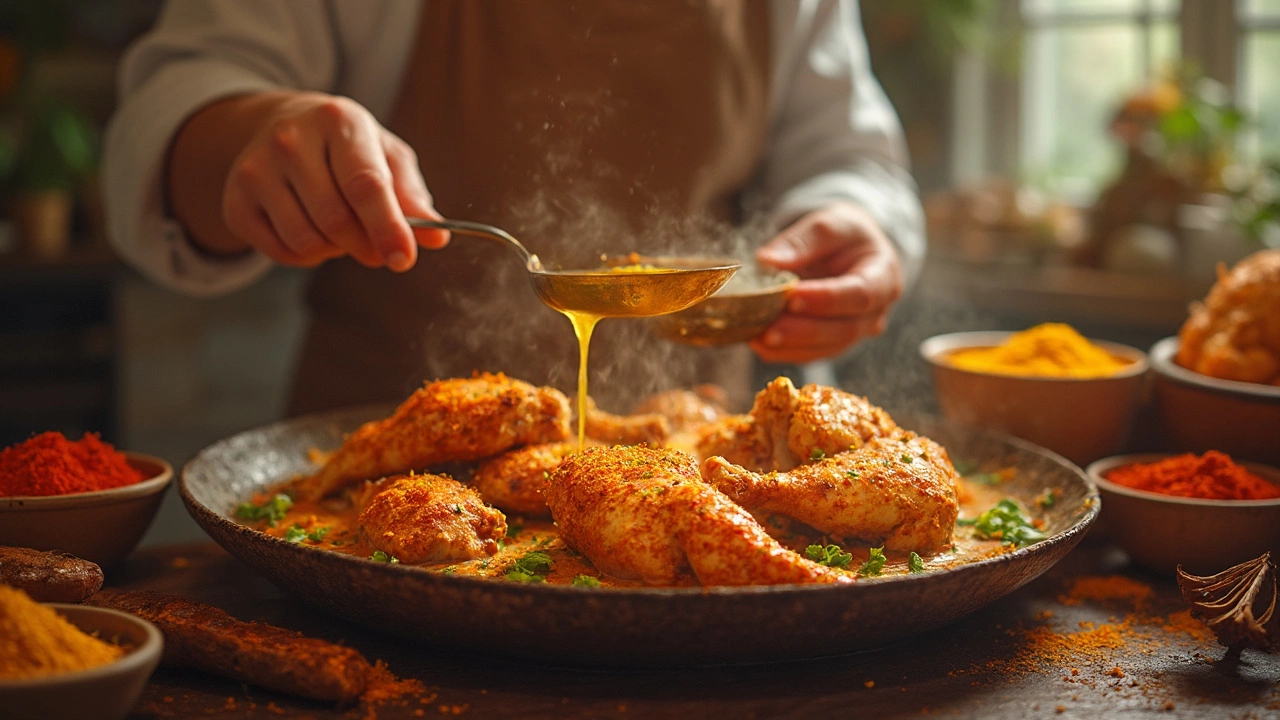Marinating tandoori chicken might seem like a simple task, but getting it right can elevate your dish from ordinary to extraordinary. Among the many components that go into a good tandoori marinade, three stand out as absolutely essential: yogurt, a mix of spices, and lemon juice. Why these three? They are fundamental to both the flavor and texture of traditional tandoori chicken.
Let's kick things off with yogurt. This isn't just a random choice; yogurt acts as the base for the marinade and is crucial for tenderizing the chicken due to its acidity. It also helps keep it moist when it cooks. Ever had dry tandoori? Chances are, they skimped on the yogurt.
- The Importance of Yogurt
- Spices that Matter
- The Role of Lemon Juice
- Bonus Tips for Marinating
- Common Mistakes to Avoid
The Importance of Yogurt
Yogurt is more than just a key ingredient in a classic tandoori chicken marinade—it's the foundation upon which the entire dish is built. But why is yogurt such a big deal in tandoori recipes? Let's break it down.
Yogurt as a Tenderizer
The magic of yogurt lies in its acidity, which gently breaks down the chicken's proteins. This process makes the meat super tender without turning it mushy. It's a slow and steady tenderizing technique, perfect for the delicate nature of chicken.
Adding Creaminess and Flavor
Besides tenderizing, yogurt also adds a creamy texture and subtle tanginess that balances the intense flavors of the spices. It brings a richness that a simple spice rub can't achieve on its own. That's why you can't skip it!
How Much Yogurt to Use?
Wondering about proportions? For about 1 kilogram of chicken, you typically need around 250 ml of yogurt. This amount ensures thorough coverage and optimal flavor infusion.
Choosing the Right Yogurt
When making tandoori chicken, opt for plain, full-fat yogurt. Low-fat variants may not yield the same depth of flavor and can make your marinade too watery, affecting how well spices adhere to the chicken.
Yogurt Varieties and Their Impact
If you're considering Greek yogurt, it's thicker and creamier, resulting in a richer marinade. Just be sure to adjust the quantity slightly because it can overpower the spice blend if not balanced properly.
In short, never underestimate the importance of yogurt in a tandoori marinade. It brings tenderness, flavor, and moisture to the table, ensuring your chicken is perfect every time.
Spices that Matter
When it comes to tandoori chicken, the spices are what bring that kick and complexity to your marinade. It's not just about heat; it's about achieving a balance of flavors that dance on your taste buds.
First up, you can't talk about tandoori without mentioning garam masala. This is a key player, a blend of spices like cumin, coriander, cardamom, and cloves. You don't need much; even a small spoonful can dramatically elevate the profile of your marinade.
Cumin adds a warm, earthy flavor that feels almost smoky, while coriander brings a lightness and rejuvenating aroma. If you're after that vibrant red hue without relying on artificial coloring, kashmiri chili powder is your best bet. It offers a mild heat and a striking color without overwhelming your dish.
Must-Have Spice List:
- Garam Masala
- Cumin
- Coriander
- Kashmiri Chili Powder
- Turmeric - Gives a subtle warmth and the yellow tinge
- Smoked Paprika - Adds depth
It may sound like a lot, but each spice has a role. The harmony they create is key to an unforgettable Indian recipe.
The cool thing? You can personalize your own blend. Want more heat? Add more chili. Love cumin? Toss in an extra pinch. But remember, it's about balance more than anything else.

The Role of Lemon Juice
You might not think much of lemon juice in a marinade, but it's actually a game-changer when it comes to preparing tandoori chicken. This tangy ingredient isn't just for a bit of acidity; it's a multitasker in the kitchen.
The Science of Tenderization
First up, lemon juice is great for breaking down the proteins in the chicken, acting like a natural tenderizer. This destroys the tough fibers and makes the meat more succulent. Who wants chewy chicken, anyway?
Flavor Booster
Beyond tenderizing, lemon juice plays a massive role in enhancing flavors. It works in harmony with spices like cumin, coriander, and cayenne, sharpening their presence and making each bite a flavor explosion. It’s that hidden zing you can't quite place but would definitely miss if it were gone.
Safety First
Lemon juice also has a fantastic side benefit—food safety. Its high acidity level helps to kill off some of the surface bacteria. This isn't a replacement for proper cooking, but it's a handy extra safety net.
Pro tip: Always squeeze fresh lemon juice. Bottled lemon juice might seem convenient, but it often lacks the punch needed for authentic tandoori flavor. So, roll up your sleeves, grab a lemon, and get squeezing!
Bonus Tips for Marinating
Marinating tandoori chicken is an art, but mastering it isn't as hard as you might think. Here are some tips to elevate your marinating game and ensure your chicken is always a hit at the dinner table.
Time is Your Friend
The longer you marinate your chicken, the deeper the flavors. Ideally, let it sit for at least 4 hours. If possible, overnight in the fridge is even better. This allows all those spices and yogurt to really seep into the meat.
Don't Skip Proper Storage
Keep your marinating chicken in a sealed container or a zip-lock bag. This prevents any cross-contamination and ensures the flavors stay locked in. Always keep it refrigerated while marinating. Safety first!
Layer Your Spices
When adding spices—like garam masala, cumin, or coriander—layer them for complexity. Start with half your spice mix, coat the chicken well, and then add the rest. This method ensures more even distribution.
Mind the Salt
Salt is essential, but too much can ruin things. Adjust according to taste, keeping in mind other salty sauces or ingredients you might add later on.
Check for Consistency
The marinade should stick to the chicken and not be too runny. If it's too thin, it won't do its job properly. You can thicken it with a little more yogurt or cream if needed.
| Marinating Time | Flavor Depth |
|---|---|
| 2 hours | Mild |
| 4 hours | Moderate |
| Overnight | Intense |
These tips aren't hard to follow, but they make a big difference. Once you've got these down, your tandoori chicken will taste like it came straight out of a top Indian restaurant. Enjoy the perfect blend of flavors with a side of perfectly cooked naan, and you've got yourself a feast!

Common Mistakes to Avoid
Nailing the perfect tandoori chicken can be tricky, and even seasoned cooks make some avoidable errors. Let's chat about a few common mistakes that often trip people up.
Using Low-Fat Yogurt
First off, using low-fat yogurt might seem like a healthy choice, but it doesn't hold up well under heat. Full-fat yogurt provides the needed richness and helps in tenderizing, making your chicken juicy and flavorful.
Rushing the Marination Process
Patience is key when it comes to marination. Letting the marinade ingredients work their magic overnight—preferably 8-12 hours—ensures that all those delicious spices infuse into the meat. If you're in a rush, aim for at least 4 hours.
Skipping the Salt
Undersalting your marinade can be a big pitfall. Salt not only enhances flavor but also aids in tenderizing the meat. Add it generously to the mixture, and taste to ensure it's just right.
Overloading with Spices
Sure, spices are what make Indian recipes like tandoori chicken shine, but throwing in too many can overwhelm the dish. Stick to essentials like cumin, coriander, and garam masala, and be cautious with the heat from chili powder.
Neglecting the Grill Temperature
Whether you're using a grill or an oven, achieving the right heat is crucial. Too hot, and you'll end up with charred outsides and raw insides. Too low, and your chicken will be dry. Aim for a medium-high heat for that perfect sear.
By avoiding these pitfalls, you're well on your way to enjoying a delicious homemade tandoori chicken that's sure to impress!
